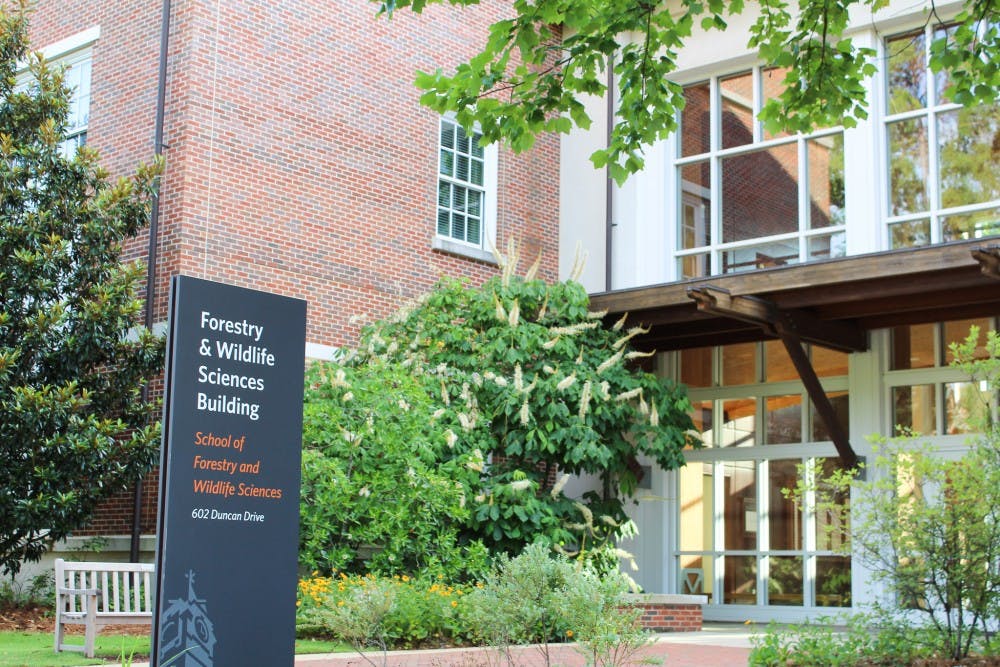Students can now declare and begin signing up for classes in the new sustainable biomaterials and packaging degree in the School of Forestry and Wildlife Sciences.
The Alabama Commission on Higher Education approved the degree in March, and the School has been working hard to recruit students for the new program. They already have over 10 students for it.
Dr. Janaki Alavalapati, dean of the School of Forestry and Wildlife Sciences, has worked with colleges across campus to create this new degree for over 2 years.
“Various dicisplines have to be involved,” Alavalapati said. “That’s why we worked very closely with the College of Engineering, the College of Agriculture, the College of Architecture and Design and the College of Business.”
Collaboration was key in creating this degree. The School of Forestry and Wildlife Sciences worked with Virginia Tech and Clemson University to learn about creating this type of degree.
Then Alavalapati and his team at the School of Forestry and Wildlife Sciences worked with four other Auburn colleges to create a unique packaging degree that will give graduates an edge in the job market.
Alavalapati said they wanted to create a STEM, science, technology, engineering and mathematics based program.
There is a need for the type of skills students in this program will learn in industries across the nation, said Dr. Scott Enebak, associate dean of academic affairs for the School of Forestry and Wildlife Sciences.
“Employers need students with these skills sets,” Enebak said. “So faculty are being requested from their research and employment partners that they need these skill sets.”
Alavalapati, Eneback and others at the School of Forestry and Wildlife Sciences looked at the skills that employers are requesting students have and compared them to the courses offered in the School and other college’s on campus.
They were able to find most of the courses they needed to create a new degree. Of the few missing, the School of Forestry and Wildlife Sciences created those, Eneback.
The forestry industry is a $22 billion industry in Alabama and packaging will soon be a $1 trillion industry. Both industries are desperate for students that know about creating sustainable packages and how to market them, Alavalapati said.
“We thought there was a big need to launch this program,” Alavalapati said. “We spent a lot of time reaching out to our industry folks. We worked with them for the curriculum and their guidance with how this program will help students in the industry.”
Alavalapati said this is the first degree of its kind in Alabama and is one of few in the SouthEast.
Students will take a range of classes offered from all of the college’s involved in creating the degree, said Dr. Brian Via, a professor of biosystems engineering.
“It will be a mixture of STEM, coupled with engineering and business classes,” Via said. “There will be an exposure across both sides of the business so that they get the classes where they can understand both the science, business and sustainability."
In order to be competitive in the job market, students will need to know how the materials behave, such as what happens to them when they get wet and how to market them or use them best. Students will need a back ground in science, business and sustainability, Via said.
“They get check-marks across these broad disciplines so that they can be multidisciplinary when they enter the industry,” Via said. “So these are the things the classes are focused on.”
Via is teaching two classes for the sustainable biomaterials and packaging degree. One is an introduction class that will teach students about the fundamentals of packaging.
Students will learn all about materials used for different types of packaging. The class also includes a lab where students will visit companies in different industries that involve packaging, Via said.
“It gives students the opportunity to hone in on which direction they might like to go,” Via said.
The other class Via teaches is about composites, which are materials that are made of several materials held together with glue such as plywood.
“There are all sorts of new composites coming out,” Via said. “For example, we have a new cross-laminated timber industry that just put a manufacturing plant in Dothan, Alabama. They cross glue and lumber to make these big, huge, large panels for tall, high-rise buildings.”
There will be a need for students in packaging in any industry to understand composites. His class will be helpful for students when they are on the job hunt, Via said.
Auburn’s program is focused on sustainability, which differentiates it from Clemson University’s program, and spans across several schools and departments which gives students a background in many areas, whereas Virginia Tech’s program which is just in one department, Via said.
“We’re trying to diversify ourselves,” Via said. “We think that by having units across campus it provides us with a unique dimension of multi-disciplinary needs that no university in the United States has.”
Do you like this story? The Plainsman doesn't accept money from tuition or student fees, and we don't charge a subscription fee. But you can donate to support The Plainsman.





